

The Australian. You have cookies turned off To use this website, cookies must be enabled in your browser. To enable cookies, follow the instructions for your browser below. Facebook App: Open links in External Browser There is a specific issue with the Facebook in-app browser intermittently making requests to websites without cookies that had previously been set. This appears to be a defect in the browser which should be addressed soon. Open the settings menu by clicking the hamburger menu in the top rightChoose “App Settings” from the menuTurn on the option “Links Open Externally” (This will use the device’s default browser) Windows Enabling Cookies in Internet Explorer 9 Open the Internet BrowserClick Tools (or “gear” icon at top right hand corner) > Internet Options > Privacy > AdvancedCheck Override automatic cookie handlingFor First-party Cookies and Third-party Cookies click AcceptClick OK and OK.
Kogan CEO says free shipping ‘doesn’t exist’ FREE shipping seems to be everywhere these days as online stores step up their game to try to lure us in.
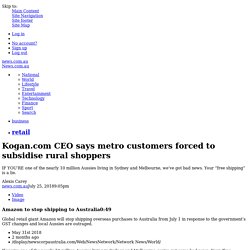
But according to one Aussie CEO, “free” is actually anything but for a huge chunk of the population. Speaking at the 2018 Online Retailer trade event, Kogan.com founder and CEO Ruslan Kogan said the offer was little more than a gimmick — and that Sydney and Melbourne residents were paying the price. China manufacturing: The big ‘Made in China’ lie. CHINA makes 80 per cent of the world’s pens, producing about 38 billion a year, yet, according to Premier Li Keqiang, none of them are up to snuff.
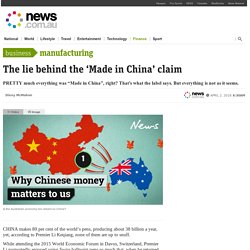
While attending the 2015 World Economic Forum in Davos, Switzerland, Premier Li purportedly enjoyed using Swiss ballpoint pens so much that, when he returned to China, he went looking for an explanation as to “why China can’t produce a pen that writes as smoothly and easily”. The key to producing a quality ballpoint pen is the tiny ball bearing fitted into the pen’s nib. It spins as it rolls across the paper, picking up ink that’s distributed from the cartridge via tiny grooves carved into the nib. If the ball is too big, it won’t spin in the nib. One that’s too small will allow the ink to leak. “Even though we’re suffering from overcapacity in the steel industry ... we still don’t possess the ability to produce the type of steel used in the ball bearings that go into ball-point pens. Enter supply-side structural reform. 'Return home': China offers five-year visa to foreigners of Chinese descent.
China has introduced a new visa for foreigners of Chinese descent in an effort to lure skilled workers.
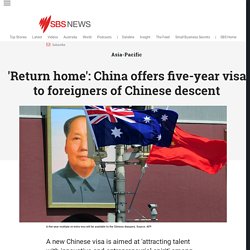
People of Chinese descent living overseas are now able to apply for a five-year multiple re-entry visa. The Ministry of Public Security said the visa would encourage overseas Chinese to "return home". The ministry's Exit and Entry Administration Bureau director Qu Yunhai told media the move was aimed at attracting overseas Chinese "to participate in China's economic development". "Such rules have played a positive role in serving China's social and economic development and attracting talent with innovative and entrepreneurial spirit," he said. Currently, overseas Chinese are allowed to apply for a one-year visa. Bubs Australia enlists Zhang ‘Nancy’ Zetian aka ‘milk tea sister’ to promote its baby formula in China. Zhang Zetian aka “milk tea sister” will help promote Bubs Australia baby formula in China.
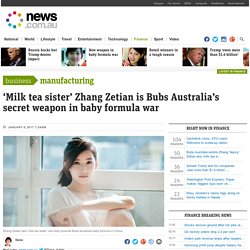
SHE’S the Chinese internet celebrity famous for looking sweet and “angelic” while holding a refreshing beverage. Zhang “Nancy” Zetian was an ordinary high-school student in the Nanjing province when a picture of her with a milk tea drink went viral. Dubbed the “milk tea sister”, a Chinese term that came to be synonymous with a pure and unassuming femininity, Zetian was among the first social media influencers to capture the public imagination in China. Now she has been recruited as the secret weapon of the newly ASX-listed baby formula company Bubs Australia, in its battle for a greater share of the $295 million dairy export industry.
Yunnan: A Planned Hub of Belt and Road. Alibaba in Australia: What exactly will the eCommerce giant do when it gets here? Chinese eCommerce giant Alibaba is coming to Australia.
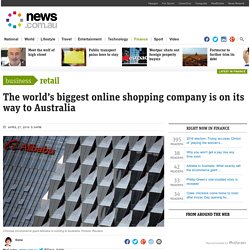
Picture: Reuters THE world’s biggest online shopping company has quietly announced plans to come to Australia. But what exactly is Alibaba, and will its presence change the way we shop? Often referred to as the Amazon of China, the $257 billion ($US197 billion) behemoth is a collection of eCommerce, cloud computing, payments and media assets. The Alibaba group of companies accounts for 60 per cent of all Chinese online sales, and this month overtook Walmart as the world’s largest retailer. Australian shoppers will be most familiar with Aliexpress, an English language eBay rival that sells everything from fast fashion to smartphone accessories, kids’ toys and camping gear. Its free shipping and crazy low prices have earned it a cult following, though some critics have labelled the wares “junk”, and the site has been plagued by suspected counterfeits.
Alibaba founder Jack Ma is Asia’s richest man. Dana.mccauley@news.com.au. Alibaba in Australia: What exactly will the eCommerce giant do when it gets here? Tesla Model S rival: Electric car from Chinese maker LeEco unveiled. Loaded: 0% Progress: 0% Tesla Motors is battling quality issues with its new high-end Model X SUV, raising questions about the auto maker's ability to ramp up and deliver on its next generation of electric cars like the more affordable Model 3.
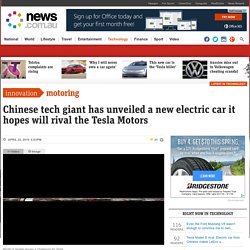
China could turn back Australian products, industry insiders fear. Loaded: 0% Progress: 0% Why the Chinese are swallowing Blackmores Chinese tourists want Australian products, but why do they insist on buying them in person?
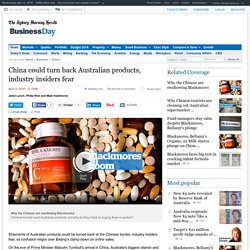
Shipments of Australian products could be turned back at the Chinese border, industry insiders fear, as confusion reigns over Beijing's clamp down on online sales. Blackmores, Bellamy's Organic, a2 Milk shares plunge on China customs crackdown. Loaded: 0% Progress: 0% Investors have sent market darlings Blackmores, Bellamy's Organic and a2 Milk on a rollercoaster ride in early trade amid a Chinese crackdown on foreign food and other consumer goods.
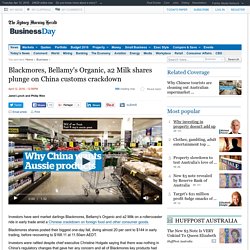
Blackmores shares posted their biggest one-day fall, diving almost 20 per cent to $144 in early trading, before recovering to $168.11 at 11.50am AEDT. Investors were rattled despite chief executive Christine Holgate saying that there was nothing in China's regulatory changes that gave her any concern and all of Blackmores key products had approval from Beijing. Bellamy's, Blackmores and A2 Milk have all taken a hit since the start of the year.
The changes involve a 11.9 per cent tax on products bought from foreign websites in an effort to protect domestic Chinese retailers as well as the creation of a "positive list" of products allowed to enter the country via free trade zones. China introduces infant formula brand restrictions. Tapping China's Skincare and Cosmetics Market through Cross-Border E-Commerce. Masks, Air Purifiers and Odour Control Dominate 2015 Breathing Expo. China's 'daigou' army plan fresh assault on our stores - and this time they're coming for our cherries. Tapping China's Skincare and Cosmetics Market through Cross-Border E-Commerce. Aussie companies look online for global markets - My Small Business - Brand Discover. This is content for Australia Post Recent declines in the value of the Australian dollar and publicity over the China Free Trade Agreement has brought the issue of Australia’s more than $300 billion worth of exports back into sharp relief.
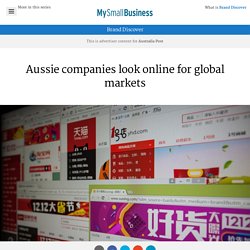
As the local economy softens after years of commodities fuelled growth, Australian companies are once again looking further afield for opportunities. Indeed many new businesses, such as online retailers are born global. Take for instance the country’s legion of eBay sellers. While not necessarily an obvious candidate to lead the export charge, merchants on the global platform punch well above their weight according to figures provided by Jooman Park, eBay Australia and New Zealand, Managing Director. “Furthermore the study found that on average, commercial eBay exporters ship to 28 destinations, while traditional exporters only ship to three,” said Mr Park.
Getting supply chains right “We look at the sustainability of an Australian company’s decision. Cultural differences fade when Westerners and Chinese fall in love. Chinese Canada immigration scam: Xun Wang helped wealthy create fake lives. A photo released by the Canada Border Services Agency shows some of the doctored Chinese passports seized from the offices of Xun Wang, along with fake Chinese immigration stamps.
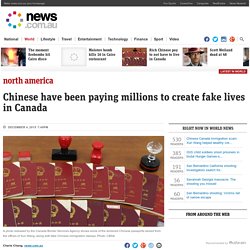
Photo: CBSA WEALTHY Chinese have been paying millions to create fake lives for themselves in Canada, just so they can avoid living in the country. In a bizarre case that is being described as the biggest immigration fraud in Canadian history, the clients of Xun “Sunny” Wang were paying tens of thousands of dollars to trick authorities into thinking they were living in Canada, when they were actually living in China.
Wang created a detailed Canadian life for his clients by forging documents including passport stamps, lease agreements and letters from schools and lawyers. The Vancouver-based immigration consultant even provided his clients with jobs, backed up by fake pay slips — with the clients paying their own wages. Karicare Aptamil, Bellamy’s, A2 Platinum formula shortage: How does it get to China? Loaded: 0% Progress: 0% Shoppers are buying up baby formula to send to China sparking a shortage of the powder. Courtesy Seven News Shelves are being stripped of infant formula as Chinese “personal shoppers” rush to cash in before the China-Australia Free Trade Agreement slashes their profit margins.
AN ARMY of Chinese expats are raking in six-figure salaries snapping up infant formula from supermarket shelves and reselling the white gold via social media. How one Australian company used Tmall to crack the Chinese market - Stories. In a globally connected world, there are many more markets available to businesses than ever before – as long as you have the right product. But what’s the best, most cost-effective way to access these markets? In the case of China, one of the largest sources of new consumers in the world, one option is Tmall Global. Tmall hosts shopfronts that can sell directly to Chinese consumers.
Frank Granziera’s Olive Oil Skin Care Co, with the help of Australia Post, is doing just that. Based in Sydney, Olive Oil Skin Care Co is a premium all-natural skin care brand that gets its raw material from an olive grove in beautiful rural NSW. Knowing their skin care products would be well suited to the Chinese market is one thing, but Frank and his partners would have had to spend a lot of money to establish their business there dealing with language issues, distribution and red tape. Frank has some good, practical advice for Australian companies looking at following him into the Chinese marketplace. Beef exports: Charles Wooley on increasing Chinese demand. Loaded: 0% Progress: 0% China can't get enough of Australian beef. This new cattle boom is seeing smart investors snapping up properties that are now worth millions of dollars.
China rates citizens for ‘social credit’: How would you score? Would your life get a good rating? IMAGINE a world where you are given a “citizen rating” based on your lifestyle, shopping habits, social behaviour and morals. China is moving quickly towards just such a system, in a Big Brother-style plan that will see everyone given a grade between 350 and 950. If you buy nappies or recycle, you get extra points for showing you are responsible. If you play video games and spend too much on clothes, you lose points. Your friends matter, too.
A low score will have serious consequences, making you ineligible for certain jobs and restricting in borrowing money, claiming benefits or finding housing. The “social credit” system is an extension of your credit rating at the bank, only it goes far beyond financial status. The idea has been developing since 2003, and China’s government hopes it will be able to give a score to every individual, legal entity and organisation in the country by the end of 2017. TPP: What the trade pact means for Australia. The agreements cover everything from the sale of steaks to niche intellectual property used by science and technology-based companies. Unions lash Chinese dairy investors as plans to import workers exposed. Battle for the bottle – the fight to feed China's babies. Selling skirt that tastes as good as sirloin to China's middle class. Five reasons the China 'currency crisis' is a beat-up.
Honey, pills and cereals: the small Aussie companies big in China. Telstra Australian Business Awards: small businesses surge into export markets. Potential ... Telstra Australian Business Awards finalists Lisa and Lachlan Laing, founders of Ecoriginals, with daughter Maya. Fake foods: Australian producers face Asian retreat in counterfeit battle. The fake wine brand Benfolds mimics the calligraphy of the famous Penfolds brand.
Cashed up Chinese tourists putting Kiwis to shame in Australia. A new film by Tourism Australia is set to show people the diversity of Aboriginal experiences in this country. Will rich entrepreneurs pay $15m to get Australian citizenship? Australia is trying to claim the next Mark Zuckerberg. Villa Del Mare: Lola Wang Li and the secretive web of Chinese wealth. Villa del Mare is a mansion on Australia’s most expensive street, Wolseley Road, Point Piper. Money laundering burden yet to hit property market. Sydney Writers' Festival author Xinran laments China's lonely children. China-born non-fiction writer Xinran, author of Buy Me the Sky. China to crack down on stock manipulation as market soars.
Chinese President's war on corruption finds its way to Brighton. Pressurization of illy coffee packaging. SPR COFFEE SERVICE. Australian Coffee Traders Association - News. Coffee Beans: A Market To Watch In 2014. Coffee is a commodities market to watch late this year and into 2014, as historically low coffee bean prices should reach a bottom and revive investor interest, according to one commodities expert. Prices have declined from recent highs of about $2 per pound, and now trade in the range of $1.15 to $1.20 on the New York ICE Futures exchange. “You really have to look at the market and see if this is the bottoming,” Carlos Sanchez, director of asset management at CPM Group, told International Business Times, referring to recent historic lows in Arabica coffee bean prices. Smart car brand axed in Australia due to slow sales.
Secret path for Chinese on property buying spree. Proposed changes to FIRB approval process under free trade agreement with China. 6 Charts That Show How We Became China's Grocery Store and Wine Cellar. Follow the UK: Import Water. New 'Rare Sugar' Making Waves In Asian Food Industry - Food Logistics Mobile. Economic Highlights. China’s packaged food market: capitalising on the rising demand for premium imported items. China's packaged food market: the advantages of the Hong Kong platform.